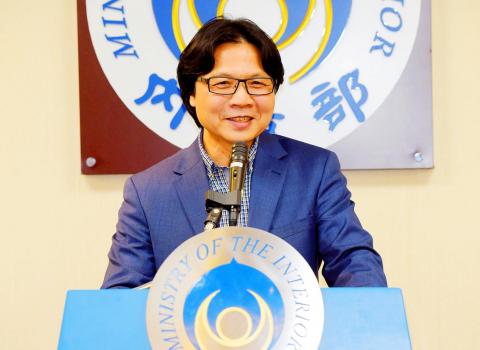Minister of the Interior Yeh Jiunn-rong (葉俊榮) yesterday denied allegations made earlier in the day by Chinese Nationalist Party (KMT) member Yu Shu-hui (游淑慧) that he had illegally taught in the People’s Republic of China (PRC).
Yu, who is running for a Taipei City Council seat, wrote on Facebook that Yeh had broken the law by teaching at Zhejiang University’s Guanhua Law School in December 2011 and January 2012, attaching a screenshot of the university’s Web site describing Yeh as a lecturer.
Yeh held a noontime news conference at the Ministry of the Interior, saying while he did give lectures in China, he did not receive compensation, which is in compliance with the law.

Photo: Huang Yao-cheng, Taipei Times
Yeh said he was a full-time National Taiwan University professor when he received an invitation from the law school’s then-vice president Zhu Xinli (朱新力) asking him to give lectures to Zhu’s “Government Regulations and Administrative Rule of Law” class.
Since he received no payment for the lectures and Zhu was the course instructor, nothing he did met the legal definition of part-time work, Yeh said.
“Everything was done strictly according to the law,” he said.
His only activities in China that resembled Yu’s allegations were the lectures in Zhejiang, though he has given talks on environmental regulations on several occasions, but all of those speaking engagements were short-term, Yeh said.
The university Web page describing him as a lecturer does not mean he was a part of the institution’s faculty and he has asked the university to take the page down to avoid further misunderstandings, Yeh said.
“As an academic, I believe in the advantages of global academic dialogue, including exchanges with China,” he said.
“While there are special circumstances across the [Taiwan] Strait, the nation has laws and regulations in place to govern [issues related to China], and I have followed them in all of my speaking engagements and short-term lectureships there,” he said.
When a reporter asked Yeh to respond to Yu’s comment that the government is guilty of double standards in stalling confirmation on National Taiwan University president-elect Kuan Chung-ming’s (管中閔) appointment while ignoring his alleged wrongdoings, Yeh said: “I am glad to have the opportunity to share with the public how international academic exchange is regulated. This is the first time I learned of this comparison and I am quite surprised. I want to clear this up as soon as possible.”

Intelligence agents have recorded 510,000 instances of “controversial information” being spread online by the Chinese Communist Party (CCP) so far this year, the National Security Bureau (NSB) said in a report yesterday, as it warned of artificial intelligence (AI) being employed to generate destabilizing misinformation. The bureau submitted a written report to the Legislative Yuan in preparation for National Security Bureau Director-General Tsai Ming-yen’s (蔡明彥) appearance before the Foreign Affairs and National Defense Committee today. The CCP has been using cognitive warfare to divide Taiwanese society by commenting on controversial issues such as Taiwan Semiconductor Manufacturing Co’s (TSMC, 台積電) investments in the

INVESTIGATION: The case is the latest instance of a DPP figure being implicated in an espionage network accused of allegedly leaking information to Chinese intelligence Democratic Progressive Party (DPP) member Ho Jen-chieh (何仁傑) was detained and held incommunicado yesterday on suspicion of spying for China during his tenure as assistant to then-minister of foreign affairs Joseph Wu (吳釗燮). The Taipei District Prosecutors’ Office said Ho was implicated during its investigation into alleged spying activities by former Presidential Office consultant Wu Shang-yu (吳尚雨). Prosecutors said there is reason to believe Ho breached the National Security Act (國家安全法) by leaking classified Ministry of Foreign Affairs information to Chinese intelligence. Following interrogation, prosecutors petitioned the Taipei District Court to detain Ho, citing concerns over potential collusion or tampering of evidence. The

‘COMPREHENSIVE PLAN’: Lin Chia-lung said that the government was ready to talk about a variety of issues, including investment in and purchases from the US The National Stabilization Fund (NSF) yesterday announced that it would step in to staunch stock market losses for the ninth time in the nation’s history. An NSF board meeting, originally scheduled for Monday next week, was moved to yesterday after stocks plummeted in the wake of US President Donald Trump’s announcement of 32 percent tariffs on Taiwan on Wednesday last week. Board members voted to support the stock market with the NT$500 billion (US$15.15 billion) fund, with injections of funds to begin as soon as today. The NSF in 2000 injected NT$120 billion to stabilize stocks, the most ever. The lowest amount it

NEGOTIATIONS: Taiwan has good relations with Washington and the outlook for the negotiations looks promising, Minister of Economic Affairs J.W. Kuo said Taiwan’s GDP growth this year is expected to decrease by 0.43 to 1.61 percentage points due to the effects of US tariffs, National Development Council (NDC) Minister Paul Liu (劉鏡清) said at a meeting of the legislature’s Economics Committee in Taipei yesterday, citing a preliminary estimate by a private research institution. Taiwan’s economy would be significantly affected by the 32 percent “reciprocal” tariffs slapped by the US, which took effect yesterday, Liu said, adding that GDP growth could fall below 3 percent and potentially even dip below 2 percent to 1.53 percent this year. The council has commissioned another institution